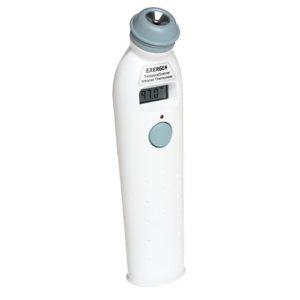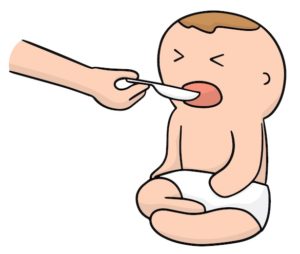Doctors’ Notes
BackFever
A common symptom that prompts parents to call their pediatric provider (as well one that keeps parents up at night) is fever.
Especially this time of year, when more children are catching colds and other ailments, that high fever at 2am brings on a lot of anxiety and questions. So this seems like a good time to address some of those questions, and allay some fears, about fevers.
What is Fever?
A fever is, as described above, a symptom. Just that. Not an illness in itself, but a sign of illness.
Some amount of fever is usually good for children; it helps them fight off whatever bug they’re fighting. We treat fevers not because they’re dangerous in and of themselves, but because they can make kids pretty miserable. That means if you notice your child has a temperature of 101, but is playing (or sleeping!), it’s perfectly fine to hold off on administering any medication and see how things go.
(Important note: if your child has seizures, including febrile seizures, or a chronic illness, some of this information may not apply. For such a child we may be more aggressive in treating fevers).
Body temperatures vary throughout the day, and even by age. So, what IS a fever? We consider a rectal temperature of 100.5 or higher to be a true fever. (Rectal temperatures of 99-100.4 are not “low grade fevers”; they’re normal temperature elevations.)
Taking Temperatures
 There are lots of ways to take temperatures, as you probably have seen from perusing the thermometer aisle at any drug store. We do recommend a rectal thermometer for infants and young children. Especially under the age of 2 months, babies are susceptible to more serious bacterial infections and may not show other signs of illness like older children do, so we want to be extra sure the temperature is accurate (more on this age group later). As children get older, it’s ok to use an oral thermometer.
There are lots of ways to take temperatures, as you probably have seen from perusing the thermometer aisle at any drug store. We do recommend a rectal thermometer for infants and young children. Especially under the age of 2 months, babies are susceptible to more serious bacterial infections and may not show other signs of illness like older children do, so we want to be extra sure the temperature is accurate (more on this age group later). As children get older, it’s ok to use an oral thermometer.
Ear thermometers may be convenient, but it actually can be fairly tricky to get an accurate temperature with them, depending on the shape of your child’s ear canal and the presence of ear wax. Temperature strips and feeling your child’s skin are not accurate ways to determine fever, since fever is an elevated internal body temperature, not skin temperature.
For more on Thermometers and Temperature-Taking, see Dr. Wolynn’s Note.
Treating Fever
When your child has a fever and is uncomfortable from it, we usually recommend giving an appropriate dose of acetaminophen or ibuprofen (for kids over 6 months). If your infant younger than 2 months has a true fever, please call us. We will recommend your child be evaluated at our office or an emergency room to make sure there are no signs of bacterial infection.

If the fever does not completely resolve or “break”, that is NOT a sign that the infection is more serious. Many fevers do not disappear with such medications. And remember: fever is a good thing, helping your child fight the infection. Also, having a very high fever does not necessarily mean a child has a very serious bacterial infection. Even run-of-the-mill cold viruses can cause high fevers.
For more on Fever Relief, see our Note on Fever and Pain Relief Doses.
Worrying About Fever
Despite what you might have heard, fever from infection does not cause brain damage. The natural temperature rise made to fight germs tops off at 105-106 degrees, due to a kind of thermostat in the brain. That said, hyperthermia from situations such as being confined in a hot car is dangerous and life-threatening, and can result in temperatures higher than 108.
So when parents ask me “what is the temperature at which I should just rush to the ER?,” I tell them there is no such temperature. Instead of focusing on the number on thermometer, we’re concerned about how your child is acting. Fevers will cause your child’s heart to beat faster, and they may be breathing faster too. Unless they are having serious respiratory distress or are unresponsive, there should be time to call one of the providers at Kids Plus for more advice before you would need to head to the hospital or call an ambulance.
What else can you do when your children have a fever? Make sure they’re drinking plenty of extra fluids (think water, pedialyte, or popsicles). Dress them lightly. We don’t recommend cold baths, which can be very uncomfortable and can cause shivering, which actually increases the body temperature. Rubbing your child down with rubbing alcohol is also not recommended, since it can be absorbed by the skin or inhaled and make your child very sick. Bathing your child in tepid water is ok, as long as your child is comfortable, and again, not shivering.
When to Call Us
We will usually want to evaluate your child in the office if he or she has had a fever with no other symptoms for 3 days or more, or for any fever lasting longer than 5-6 days. If your child has any other concerning symptoms (signs of dehydration or ear pain, for example) he or she should be checked as well.
So, the next time your child has a fever, remain calm, and remember that the fever is one of the body’s ways of fighting infection. Keep your thermometer and acetaminophen handy, and remember you can always call us with any concerns!
Dr. Amy Maddalena, a Kids Plus Doc since 2006, teaches a monthly Expectant Parent Orientation at our Pleasant Hills office.